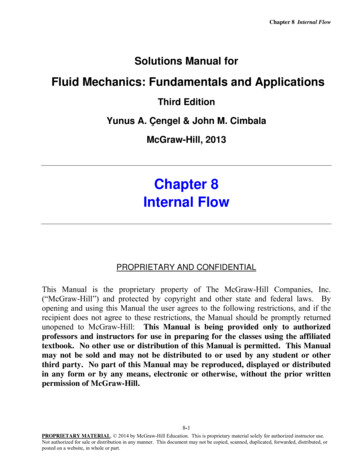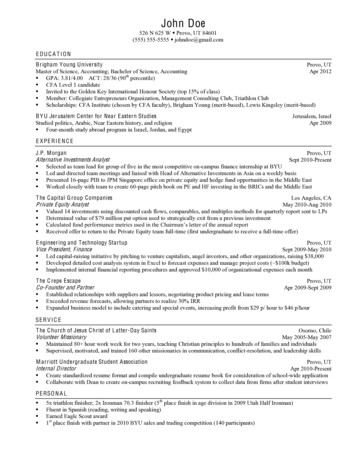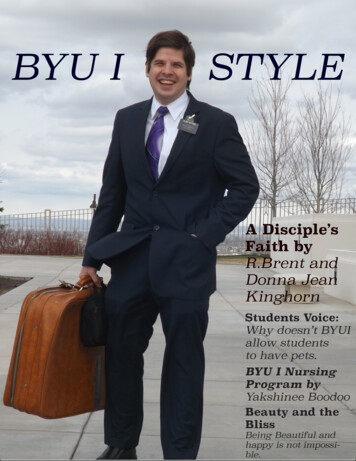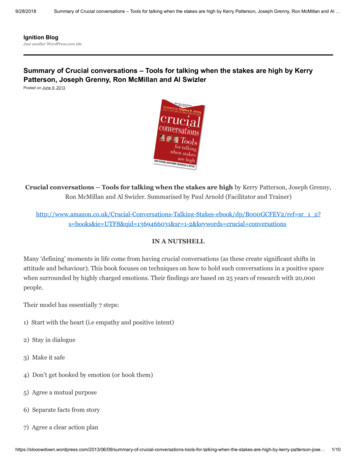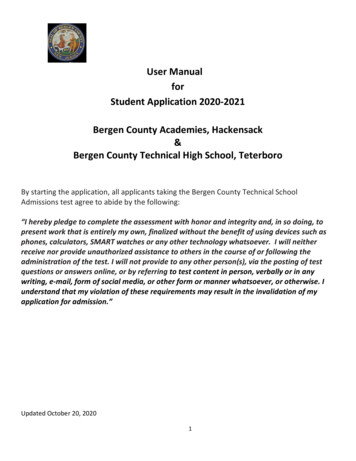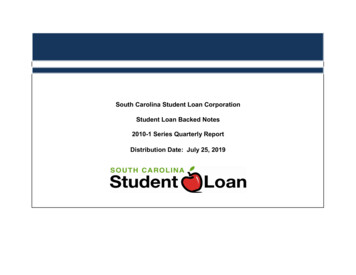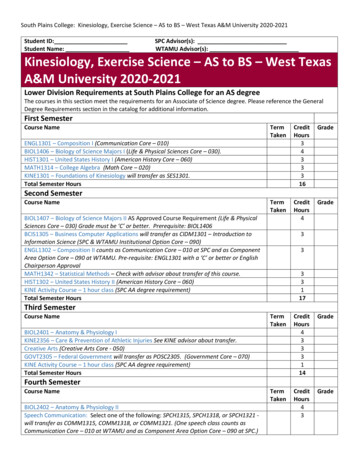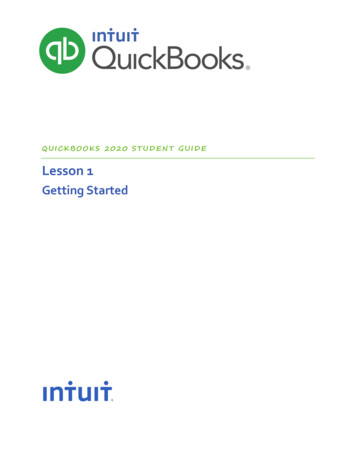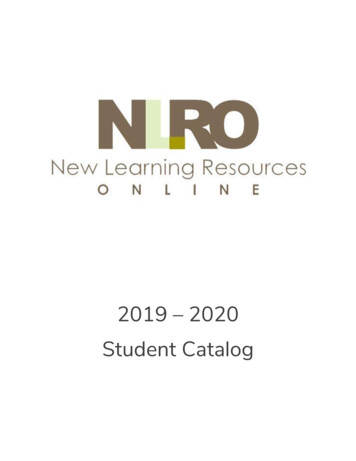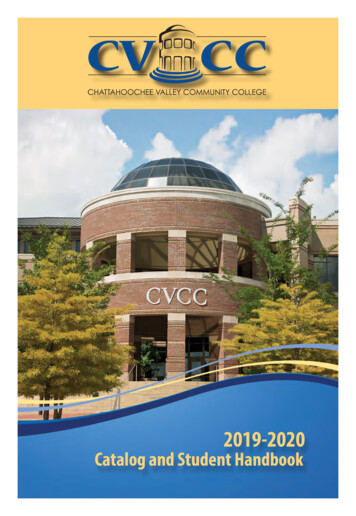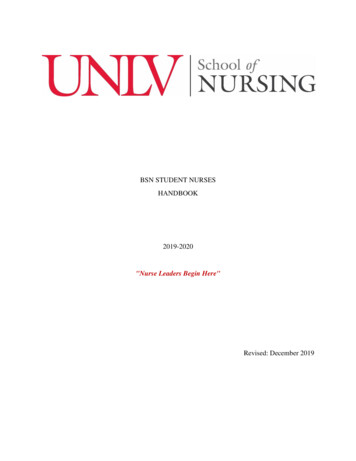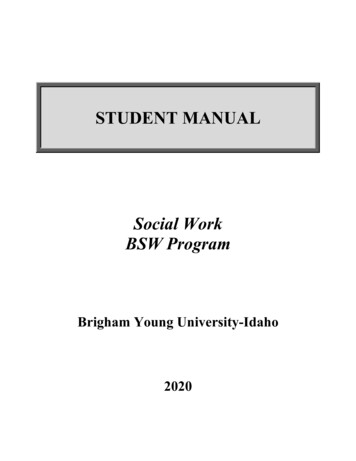
Transcription
STUDENT MANUALSocial WorkBSW ProgramBrigham Young University-Idaho2020
Table of ContentsAdministration and Staff . 3Social Work Program. 4Mission. 4Program Goals . 4Program Competencies . 4Admissions Process to the Social Work Program. 5Course Work . 6Social Work Student Organization . 6Social Work Program Field Education . 6BYU-Idaho Social Work Program Policies and Procedures. 7Transfer Credit Policy . 7Life or Work Experience Policy . 7BYU-Idaho Social Work Program Advising Policy . 7Academic Performance Policy . 8Professional Performance Policy . 8Student Grievance Policy . 8Informal Grievance Procedure . 8Formal Grievance Procedure . 9Termination from Program Policy . 9Student Role in Policy development and Modification . 11Appendix A . 12BYU-Idaho Social Work Program Competencies . 122
Brigham Young University-IdahoSocial Work Undergraduate ProgramAdministration and StaffDepartment ChairSociology/Social WorkDepartmentJeffrey Oliver132 C Ricks(208) 496-4166E-Mail: OLIVERJ@BYUI.EDUSocial Work ProgramDirectorPaul Roberts, PhD, LCSW132 D Ricks(208) 496-4159E-Mail: ROBERTSP@BYUI.EDUField Work DirectorGrover Wray, PhD, LMSW132 K Ricks(208) 496-4165E-Mail: WRAYG@BYUI.EDUField Work LiaisonCara Hafen, LMSW(208) 496-4514-Mail: HAFENC@BYUI.EDUOffice ManagerSociology/Social WorkDepartmentKarri Tingey132 Ricks(208) 496-4151E-Mail: TINGEYK@BYUI.EDUInstructorSteven Hay MSW, PhD.110 M Ricks(208) 496-4157E-Mail: HAYS@BYUI.EDUInstructorRichard Whiting, PhD, LCSW132 J Ricks(208) 496-4164E-Mail: WHITINGR@BYUI.EDU3
Brigham Young University-IdahoSocial Work ProgramMissionThe mission of the Brigham Young University-Idaho Social Work program is to support theoverall mission of BYU-Idaho, and the Church of Jesus Christ of Latter-day Saints by helpingstudents of diverse interests and abilities: Learn to exhibit faith in Jesus Christ as a principle of power and action, acceptresponsibility for learning, exhibit integrity, and become leaders in their families,profession, and community. Understand the social work values of the importance of human relationships, the dignityand worth of individuals as it relates to learning to love, serve and teach one another andunderstand the importance of all other social work values. Become aware of how the person-in-environment framework, global perspectives,diversity, poverty, human rights issues, political contexts, economic contexts, socialcontexts, cultural contexts, demographic contexts, and global contexts relate to personenvironment transactions. Use scientific inquiry and technology to strive to strive for environmental, economic, andsocial justice, to eliminate poverty, enhance the quality of life for all persons on a localand global level, and prepare to work within the context of their client’s specific cultures. Develop the social work knowledge, values, and skills necessary to be competent,compassionate, effective, and Christian service oriented professional social workers at thegeneralist social work practice level with individuals, groups, families, organizations,communities and society. Use and integrate social work historically grounded purposes, philosophy, knowledge,values, supervision, consultation, scientific inquiry, and skills to promote human andcommunity well-being, human rights, understand diverse groups, provide leadership inthe development and evaluation of social policy and social service delivery systems, andto provide leadership in professional social work employment and in their roles as parentsand citizens.Program Goals1. Encourage students to exercise faith in Jesus Christ to guide their efforts in learning, leading,and serving others.2. Prepare students to apply social work values in practice.3. Teach students to understand the application of theory.4. Prepare students to use scientific inquiry, theory, and practice to advocate for social justice.5. Prepare students to become competent and effective professional generalist social workpractitioners who exercise faith in Jesus Christ.6. Prepare students to use knowledge, values, and skills to promote the wellbeing of individuals,groups, and communities.Program Competencies1. Demonstrate ethical and professional behavior2. Engage diversity and difference in practice4
3. Advance human rights and social, economic, and environmental justice4. Engage in practice-informed research and research-informed practice5. Engage in policy practice6. Engage with individuals, families, groups, organizations, and communities7. Assess individuals, families, groups, organizations, and communities8. Intervene with individuals, families, groups, organizations, and communities9. Evaluate practice with individuals, families, groups, organizations, and communities10. Integrate generalist social work practice and Christian service11. Prepare for practice in specific areas of social workFor a complete explanation of each competency, see Appendix A.Admissions Process to the Social Work ProgramApplication is required for admission to the BYU-Idaho Social Work Program. Successfulapplicants must meet the following criteria:1. Complete the entire BYU-Idaho Social Work Program application.2. Demonstrate potential of completion of all foundations education requirements beforestarting the BYU-Idaho Social Work Program.3. Cumulative grade point average is at least 2.5.4. A statement of psychological well-being,5. Complete these prerequisites with at least a C-, SW 260 and Soc 111 Bio 230, Psych111, and Math 221C.Deadlines for submitting applications are the first Friday in October to start the program inWinter semester, the first Friday in February to start the program in the Spring semester, and thefirst Friday in May to start the program in the Fall semester. An application can be accessed -work/program-applicationAt the discretion of the Undergraduate Social Work Admissions Committee you may be asked tomake an appointment for an interview. Please take note that there are limited slots available inthe major. Unfortunately, this means that many applicants, some with excellent qualifications,may be denied admission.5
Course WorkOnce admitted to the program it is recommended you take courses in the following order toavoid conflicts in your schedule and to allow you to complete a field practicum placement.Course SequencingFirst SW362 Social Work Practice I-IndividualSemester: SW 367 Human Behavior in the SocialEnvironment SW400 Social Work Values and EthicsSecond SW 364 Social Work Practice II-GroupSemester: SW 365 Social Work Practice IIICommunity/Macro SW 463 Child WelfareThird SW340 Research MethodsSemester: SW464 Diverse Clients SW466 Social WelfarePolicy Other Required Course* Other Required Course* SW 465 Mental Health Other Required Course* Other Required Course* SW397 Practicum SW 398 Practicum Other Required Course*Fourth SW497 Practicum Other Required Course*Semester: SW498 Practicum Other Required Course* Other Required Course*This sequencing ensures that Social Work classes listed in the same semester will not haveschedule conflicts with one another. It does not guarantee that other required courses will befree of scheduling conflicts in any given semester. It is encouraged that students take as fewclasses as possible (not more than 14 credits) during their field practicum.*Other required classes include 9 credits of enrichment, 3 credits of adolescent studies (Child320 or SOC 383), PSYCH 342 (Abnormal Psychology), 3 credits of family studies (SW 311 orSOC 311), 3 credits of substance abuse studies (HS 460 or SOC 420), and 3 credits ofDiversity/Special Population (ANTHRO 101, HS 351, INTST 349, INTST 350, PSYCH 310,SOC 323, SOC 395R, SPED 221).Social Work Student OrganizationParticipating in the Social Work Society is an excellent way to meet others interested in socialwork, share resources, and make a difference in others’ lives. You do not need to be a socialwork major to participate but do need to be a social work major to participate in leadership of thesociety. The social work society meets together regularly during the semester to address issuessuch as navigating the social work program, planning for graduate school, leaning about differentareas of social work practice, providing service, and networking with others. The society alsoprovides an opportunity to organize and address policy change in the BYU-Idaho Social WorkProgram. You can get a list of current officer contact information by going y/contacts.Social Work Program Field EducationThe field practicum program at BYU-Idaho is an integral part of our generalist social workeducation and is the capstone experience of the program. The goal of the field practicum is to6
integrate academic knowledge with actual experience. Altogether, 500 hours of supervisedpracticum are required to graduate from the program. In order to qualify for the field practicum,a student must:1. Be in their last year of social work education and have completed the requisite coursework, (professional foundation practice curriculum SW 362, SW 364, SW 365, SW 367,SW400).2. Be deemed prepared by the BYU-Idaho Social Work Program Field Work director.3. Qualify for any other criteria defined by the specific agency offering the social workpracticum placement (For example, pass a criminal background check).For additional information about the field practicum, see the Field Practicum ocial-work)BYU-Idaho Social Work Program Policies and ProceduresTransfer Credit PolicyThe Sociology/Social Work Department Chair makes final decisions about the evaluation oftransfer credit for social work required classes. This is done in consultation with the BYU-IdahoSocial Work Program Director and the social work faculty who teach the same or similar courseas the transfer course. Courses proposed for transfer credit for core BYU-Idaho Social WorkProgram practice courses (ie SW362, SW364, SW365, SW367, SW400, SW397, SW398,SW497, SW498) must have been taught in a social work program with Council on Social WorkEducation (CSWE) accreditation and be equivalent to a course taught in the BYU-Idaho SocialWork Program. All other courses proposed for transfer credit must have been taught at aregionally accredited institution of higher education, and must also be equivalent to the coursetaught at BYU-Idaho. The Sociology/Social Work Department Chair also oversees substitutions,waivers, exceptions to major requirements, and graduation applications. This is done on a caseby case, course by course basis.Life or Work Experience PolicyThe Social Work department at BYU-Idaho does not grant social work course credit for lifeexperience or previous work experience.BYU-Idaho Social Work Program Advising PolicyAcademic advising and professional mentoring is key to the mission of BYU-Idaho and theBYU-Idaho Social Work Program. It is the responsibility of the BYU-Idaho faculty and staff toprovide advising and mentoring when needed or requested by students. Academic advisingaddresses issues such as course sequencing, meeting course requirements, selecting electives,and improving academic performance. Professional mentoring includes discussing career goals,graduate school opportunities, providing letters of reference, and consulting about employmentopportunities.ProcedureTo ensure students have access to adequate information about their education and career,each student admitted to the BYU-Idaho Social Work Program will be provide advisingin the following ways:1. Each student will be sent advising information upon acceptance to the BYU-IdahoSocial Work Program.7
2. Each student will be invited to participate in a new student orientation uponacceptance to the program.3. Each student will be assigned a faculty mentor who is a social work instructor.4. Each student will be provided career advising/mentoring by their assigned facultymentor and other instructors in the program.Academic Performance PolicyAcademic performance evaluation in the BYU-Idaho Social Work Program follows the samegrading system as adopted by the university. Students must complete all social work requiredcourses with at least a C- grade; no D grades are acceptable in the major.ProcedureAcademic performance is evaluated by instructors in each course base on the studentmeeting the criteria outlined in the course syllabus. Graded assignments are based oncourse objectives that are linked to program competencies. Students are given regularfeedback on their academic performance throughout the semester.Professional Performance PolicyIn addition to in-class assessments of professional performance, the main assessment of studentprofessional performance takes place in the field practicum experience where a practicingprofessional social worker assesses student accomplishment of program competencies in apractice setting. This final evaluation of a student’s professional competence is based on alearning agreement completed by the student at the beginning of the field practicum placementwith the field instructor. Evaluation also takes the form of verbal feedback, written feedback,and a grade on the final evaluation.ProcedureThe student, in cooperation with the field instructor, will complete a learning agreementderived from the program competencies. Once the learning agreement is approved by thefield director, the field instructor evaluates the student’s performance throughout thesemester. At the end of the semester, the field instructor completes a final evaluationwhich results in a letter grade for the field practicum (see Field Practicum Manual p 8).Student Grievance PolicyThe BYU-Idaho Social Work Program adheres to the BYU-Idaho grievance policy and willattempt to resolve any student grievances at the instructor, program, or department level asappropriate. If efforts to resolve student grievances are not successful at the department level,students pursue their grievances at the college or university level.Informal Grievance ProcedureStudents are first encouraged to discuss their grievance with the faculty member ordepartment member against which the grievance is brought. An attempt should be madeto resolve the grievance through informal and personal communication with the personsinvolved. If this attempt at resolution is not successful, a faculty member, not initiallyinvolved, is asked to mediate the situation. Both parties involved with the grievance,8
must agree on the selection of the mediating faculty member. If resolution is not reached,an appeal may be made using the formal procedure listed below.Formal Grievance ProcedureIf the student’s grievance is not resolved by informal and personal communication, thestudent should file a written grievance as soon as possible, but in no case longer than twoweeks from the time of dispute or dissatisfaction with program, faculty, or courseassessment. The written grievance should state the exact nature of the grievance, orcause of dissatisfaction, the parties involved, and the nature of the situation. Thisgrievance will be submitted to the social work program director and the department chair.An Ad Hoc formal grievance committee will be established by the department chair andsocial work program director to hear the appeal. The Ad Hoc formal grievancecommittee will consist of one undergraduate student and two faculty members. Bothparties involved in the dispute or grievance must approve of the appointments made bythe program director and the department chair. The faculty member who tried to resolvethe dispute or grievance in the informal attempt cannot be appointed to the Ad Hocformal grievance committee. One of the faculty members appointed to the Ad Hoccommittee serves as chair of the committee and votes only in a tie-breaking situation.The Ad Hoc formal grievance committee will hear any information listed in the formalwritten grievance and any other information related to the formal written grievancepresented by the parties involved in the grievance.After hearing all the information presented, the formal grievance committee’sconclusions and recommendations will be submitted in writing, within five days, to allparties involved and to the program director and department chair, unless the programdirector and/or the department chair is the individual against whom the grievance is filed.In the event the grievance is directed toward the program director, the complaint ishandled by the department chair. If the complaint is directed toward the departmentchair, and/or the program director, it is then forwarded to the Dean of the College ofEducation and Human Development. The program director and the department chair willnotify, in writing, the complainant(s), the faculty involved, and the college dean of theirdecision within thirty days. All written material will be held in confidence in thedepartment chair’s office.If students are dissatisfied, they can appeal no later than thirty days after the date of theprogram director and department chair’s notification letter of the department’s decision.Appeals can be made through formal university channels of administration (See theuniversity Student Academic Grievance Policy ).Termination from Program PolicyA student may be terminated from the BYU-Idaho Social Work Program for the following 3reasons:(1) Failure to meet university standards resulting in the suspension or dismissal of thestudent by the university.(2) A student may also be placed on probation or be terminated from the program for notmeeting the BYU-Idaho Social Work Program academic standards. If a student fails tomaintain a 2.0 grade point average in social work course work, they will be placed on9
academic probation in the BYU-Idaho Socia
BYU-Idaho Social Work Program Advising Policy Academic advising and professional mentoring is key to the mission of BYU-Idaho and the BYU-Idaho Social Work Program. It is the responsibility of the BYU-Idaho faculty and staff to provide advising and mentorin
